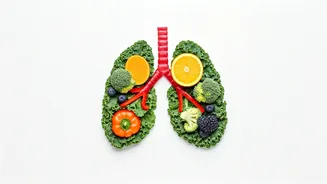Processed Meats: Caution Advised
Processed meats, often enjoyed in sandwiches and as convenient snacks, can pose a risk to your lung health. Foods such as bacon, sausage, and deli meats frequently
contain nitrites and nitrates. These additives are used for preservation, but when heated, they can release nitrosamines, which are known carcinogens. Studies suggest a link between high consumption of processed meats and an increased risk of chronic obstructive pulmonary disease (COPD) and other respiratory ailments. For individuals concerned about their lungs, reducing or eliminating processed meats from the diet is a beneficial step. Consider alternative protein sources like lean poultry, fish, or plant-based options to promote better lung function and overall health.
Sugary Beverages: Hidden Dangers
Sugary drinks, from sodas to fruit juices, are frequently packed with refined sugars that, in excess, can harm your lungs. These beverages can contribute to inflammation throughout the body, including the respiratory system. Inflammation can narrow the airways, making breathing difficult and potentially exacerbating conditions such as asthma. Furthermore, excessive sugar intake may weaken the immune system, making you more susceptible to respiratory infections. Cutting back on sugary beverages is a wise choice for lung health. Opt for water, herbal teas, or naturally flavored drinks. These choices help to keep you hydrated without the harmful effects of excess sugar, supporting healthier lungs and overall well-being.
Refined Grains: Inflammation Source
Refined grains, prevalent in white bread, pastries, and many snacks, can indirectly compromise your lung health. They are often high on the glycemic index, leading to rapid spikes in blood sugar levels. This can trigger inflammation, which can affect the lungs. Inflammation can contribute to airway constriction and increase the severity of respiratory symptoms. Instead of refined grains, choose whole grains, such as brown rice, quinoa, and whole-wheat bread. These options provide fiber and nutrients, promoting stable blood sugar levels and minimizing inflammatory responses. By swapping out refined grains for their whole-grain counterparts, you can help support healthier lungs and reduce the risk of respiratory problems.
Salty Foods: Fluid Retention
Consuming an excessive amount of salt may lead to fluid retention, which can have adverse effects on lung function. Excess fluid can build up in the lungs, making it harder to breathe. This can worsen symptoms for people with asthma, COPD, or other respiratory conditions. Furthermore, high sodium intake can contribute to high blood pressure, putting more strain on the heart and potentially impacting overall respiratory health. To protect your lungs, be mindful of your salt intake. Reduce the use of salt in cooking, and be cautious about processed foods, which often contain high levels of sodium. Choose fresh, whole foods and season with herbs and spices for flavor, supporting both lung health and cardiovascular well-being.
Dairy Products: Mucus Production
For some, dairy products can stimulate the production of mucus, potentially causing discomfort for those with respiratory issues. While dairy does not affect everyone in the same way, some individuals experience an increase in mucus production after consuming milk, cheese, and yogurt. The thicker mucus can be challenging to clear, leading to congestion and breathing difficulties. If you suspect that dairy impacts your lungs, consider reducing your intake or trying dairy alternatives, like almond milk or soy yogurt. Monitoring your body's response can help you identify if dairy contributes to your respiratory challenges. Adjusting your diet accordingly can help to relieve symptoms and maintain healthier lungs.
Fried Foods: Irritating Oils
Fried foods, particularly those cooked in unhealthy oils, can be problematic for lung health. During the frying process, oils can break down and release harmful compounds that can irritate the airways and lungs. These compounds might trigger inflammation and make breathing difficult. Foods that are heavily fried often contain trans fats, associated with increased inflammation. By minimizing the consumption of fried foods, you can lessen exposure to these harmful substances. Choose healthier cooking methods, such as baking, grilling, or steaming, and focus on incorporating foods cooked in healthy oils like olive oil or avocado oil. These choices will help to create a diet that supports healthier lungs and respiratory function.
Alcohol: Immune System Impact
Excessive alcohol consumption may weaken the immune system, increasing vulnerability to respiratory infections. Alcohol can impair the function of immune cells, making it more challenging for your body to fight off viruses and bacteria that affect the lungs. Furthermore, alcohol can dehydrate the body, thickening mucus and making it harder to clear from the airways. If you are keen on protecting your lungs, moderation in alcohol intake is recommended. Ensure you stay hydrated, and support your overall immune function through a balanced diet, regular exercise, and sufficient sleep. Adopting these habits can strengthen your defenses against respiratory infections and help maintain healthier lungs.





















